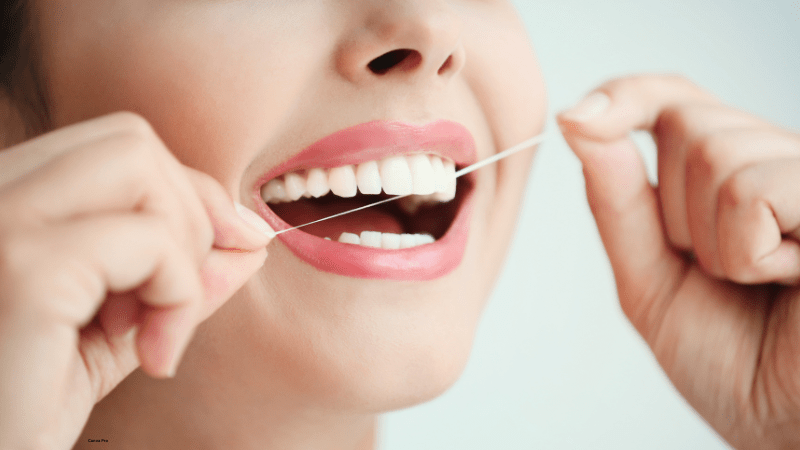Why Dental Floss is Essential for Your Health and Longevity
Discover how Dental Floss not only freshens your breath but also plays a crucial role in enhancing overall health and longevity and preventing serious diseases linked to poor oral hygiene.
Every time you floss and brush your teeth, you are not only keeping your breath fresh and maintaining your smile, but studies indicate that you may also be enhancing your overall well-being and potentially even prolonging your life.
According to Anita Aminoshariae, a professor of endodontics at Case Western Reserve University School of Dental Medicine, dentistry is frequently viewed as primarily focused on improving appearance. However, she emphasizes that the mouth is intricately connected to the rest of the body. Research has demonstrated that maintaining good oral health is crucial for overall well-being, including heart and longevity, even though this connection may not be commonly recognized.

Understanding the Oral-Systemic Link
Understanding that oral health extends beyond the mouth is crucial. It’s not just about a bright smile but about your overall well-being and longevity. This knowledge empowers you to take control of your health.
Researchers have studied the linkage between oral health and overall health for a long time, and it is known as the “oral-systemic link.” Early studies focused on the correlation between oral health and diabetes, and it has now been firmly established that treating gum disease can lead to improvements in blood sugar levels for diabetic patients. In contrast, uncontrolled diabetes can worsen gum disease. These findings have been supported by various studies, such as [this one] (https://www.cochrane.org/CD004714/ORAL_does-treatment-gum-disease-help-people-diabetes-control-blood-sugar-levels) and [this one] (https://www.ncbi.nlm.nih.gov/pmc/articles/PMC9954907/).
Oral Health and Cardiovascular Disease
The connection between oral health and cardiometabolic health is evident, as seen in various studies. According to a research review by Aminoshariae et al., individuals with 10 or fewer natural teeth have a 66% higher chance of dying from cardiovascular disease compared to those with better oral health. Yu et al. also found in their study that individuals who rate their oral health as fair or poor have a higher risk of dying and are more likely to have cardiovascular disease, osteoporosis, and diabetes.
Correlation or Causation?
According to Yu, similar to most studies on the connection between oral and systemic health, these studies do not offer conclusive evidence of causation. It is plausible that the relationship may operate in reverse, with individuals in poor health being more prone to experiencing poor dental well-being. Factors such as socioeconomic status and availability of nutritious food may also contribute to this relationship.
The Protective Role of Teeth
According to Aminoshariae, good oral hygiene directly impacts overall well-being. She compares the teeth to dunes, a barrier between the sea and the land. Similarly, Aminoshariae believes that teeth protect the body from harmful substances that can lead to illness. She also emphasizes the importance of preserving one’s teeth, as losing them can leave the body vulnerable to various diseases.
The Role of the Microbiome
According to Yu, the microbiome, which refers to the vast array of bacteria, viruses, and other microbes present in the human body, could be another potential reason. Failure to properly clean teeth can lead to changes in the bacterial communities in the mouth, potentially leading to gingivitis and gum disease over time.
The Impact of Poor Gum Health
Poor gum health can have a significant impact. According to Yvonne Kapila, a professor and associate dean of research at the University of California, Los Angeles School of Dentistry, the blood vessels in the gums become permeable. This means that when the gums are inflamed or unhealthy, harmful environmental substances, such as bacteria and viruses, can enter the body through the bloodstream, potentially causing further complications. These complications can range from minor issues like bad breath to more serious conditions like heart disease and diabetes.
Hope in Oral Health Care
According to Kapila, there’s hope in oral health care. Bacteria or other microbes from the gums may enter the bloodstream and lead to illness or irritation in different body parts. However, studies, including those conducted by her team, indicate that altering the microbiome in the mouth, such as through gum disease treatment, could potentially improve or reverse these conditions, indicating a direct correlation between oral health and overall well-being.
Tips for maintaining good oral hygiene
The great news is that most individuals know the necessary steps to maintain a healthy mouth: consuming a nutritious diet, brushing twice daily (morning and night), and regularly flossing. According to Yu’s study, insufficient flossing is linked to a higher mortality risk, while other research reveals that proper flossing practices decrease the likelihood of developing gum disease. Additionally, brushing for a minimum of two minutes twice daily reduces the chances of developing cardiovascular diseases, as stated by other studies. To ensure you’re maintaining good oral hygiene, it’s also important to use fluoride toothpaste, clean your tongue, and avoid tobacco products.
According to Yu, just as it is necessary to take a shower every day, brushing your teeth and cleaning the spaces between them daily are essential tasks that should not be overlooked.
Proactivity is key in maintaining good dental health. It is essential to maintain regular dental appointments twice a year so that a professional can evaluate the health of your teeth and gums and take action if needed before any issues become severe. According to Kapila, prevention is crucial in maintaining good dental health.
Source:
Jamie Ducharme (August 5, 2024). Reading This Will Make You Want to Floss. Times. https://time.com/7006165/flossing-teeth-benefits/. Accessed August 6, 2024
Other posts you might like:
Unraveling the Mysteries of Migraines: What Women Need to Know
Unveiling the Power of High-Intensity Interval Training (HIIT)
Category
- Health Issues (72)
- Healthy Diet (48)
- Herbs for Health (11)
- Mental Health (33)
- Skin Care (20)
